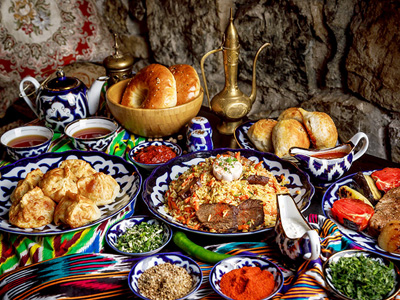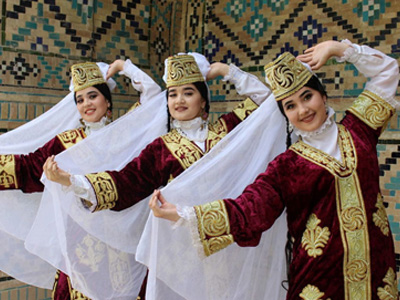Food

Food:
Uzbek cuisine is a harmonious fusion of history and flavors, deeply rooted in its cultural diversity.
Influenced by the ancient Silk Road and neighboring lands, it offers a spectrum of tantalizing dishes.
At the heart of this gastronomic journey is "Plov," a fragrant rice pilaf adorned with succulent lamb, carrots,
and aromatic spices. "Shashlik," marinated grilled meat, captivates palates, while "Lagman," a hearty noodle soup,
embraces warmth with tender lamb and hand-pulled noodles. Street-side delights like "Samsa," savory pastries with seasoned fillings,
and delicate "Manty," steamed dumplings, infuse every bite with tradition.
Uzbekistan's sweets, like "Chak-chak," honey-kissed dough spheres, celebrate joyous occasions. This culinary voyage is adorned with breads,
soups, salads, and desserts, often catering to diverse dietary choices. A symphony of bold flavors and local ingredients, Uzbek cuisine
invites everyone to relish its rich history and cultural heritage with each savory morsel.
Traditions :
Uzbekistan has a rich cultural heritage, with traditions that reflect the country's long history and diverse population. Some of the most important traditions include:
Traditions

Hospitality

Hospitality:
Uzbekistan is known for its warm hospitality and generous spirit. Guests are treated with great respect and are often invited to share meals and cultural experiences with their hosts.
Cuisine:
Uzbek cuisine is a blend of various influences, including Persian, Turkish, and Russian. Some of the most popular dishes include
plov (a rice dish with meat and vegetables), shashlik (grilled meat), and lagman (a noodle soup with vegetables and meat).
.jpg)
Crafts: Uzbekistan is famous for its traditional crafts, including silk weaving, ceramics, and embroidery. These crafts are often passed down through generations and are an important part of the country's cultural heritage.
Music and dance: Uzbek music and dance are an integral part of the country's cultural identity.
Traditional music includes a variety of instruments, such as the dutar (a two-stringed lute) and the doyra (a percussion instrument). Traditional dance forms include the katta ashula (a group dance) and the lapar (a solo dance).
Festivals: Uzbekistan celebrates a variety of festivals throughout the year, many of which are linked to Islamic traditions. Some of the most important festivals include Navruz (the Persian New Year), Eid al-Fitr (the end of Ramadan), and Eid al-Adha (the Festival of Sacrifice).
These traditions reflect the unique blend of cultures and influences that have shaped Uzbekistan's history and identity.
They continue to play an important role in the daily lives of Uzbek people and are a source of pride for the country.